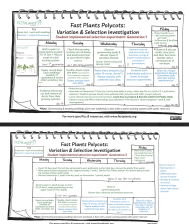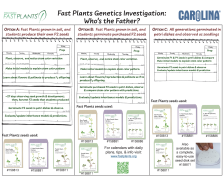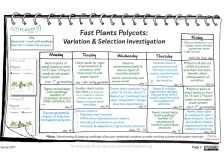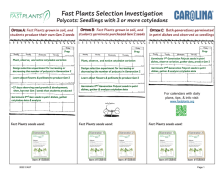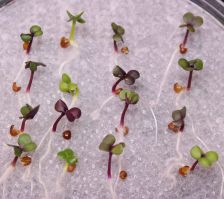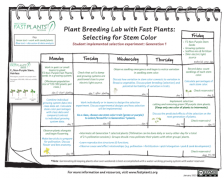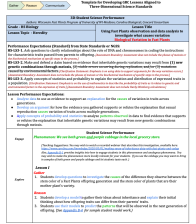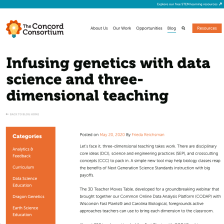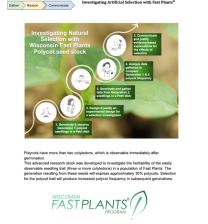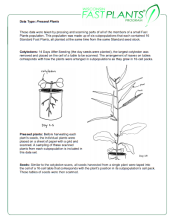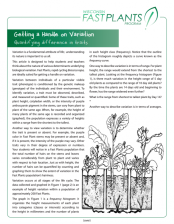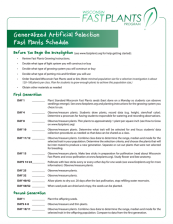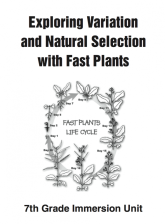Browse Resources
Educational Resources -- Grade Level: Secondary -- AP Biology Resource
Resources | |
|---|---|
This PDF document shows in detail the possible day-to-day learning associated with the 6-week version of the Fast Plants Polycot Selection / Plant Breeding Investigation (aka Option A).
Conducting this selection / plant breeding investigation uses Generation 1 Polycot Fast Plants seed lines, with...
This PDF document shows three calendars side-by-side for comparing the time and materials needed for three different versions of the Fast Plants Mendelian Inheritance Investigation that is commonly called "Who's the Father?"
Option A involves students growing the F1 generation of Fast Plants in...
This PDF document shows in greater detail the possible day-to-day learning associated with the 3-week version of the Fast Plants Polycot Selection Investigation.
Conducting this selection investigation in just 3 weeks involves using Polycot Fast Plants seed lines for both Generation 1 and 2...
This PDF document shows three calendars side-by-side for comparing the time and materials needed for three different versions of the Fast Plants Polycot Selection Investigation.
Option A involves Fast Plants grown in soil, and students select for or against polycots, then produce their own...
Preparing Your Students for the Future: Undergraduate Research Experiences with RapidCycling BrassicThis article with practical instructions about using Fast Plants in undergraduate research experiences was published as an addendum to a workshop given at the 2017 ABLE Conference in Madison, WI. Contains ideas for helping students at high school and undergraduate levels to conduct independent...
This blog post from the Wisconsin Fast Plants features open source educator resources, developed in 2023. These resources support the teaching of genetics concepts with tools focused on a Dihybrid Inheritance Study. This study provides a two-week approach for observing three generations of plant...
This blog post from the Wisconsin Fast Plants website describes the observation of plant hairs (trichomes) for conducting a selective breeding experiment (such as in AP Biology investigations). The number of hairs is variable in Fast Plants seed varieties, and selection for or against plant...
This document includes a timeline and calendar to serve as planning tools for teachers to use when figuring out when to begin the steps associated with conducting a two-generation artificial selection experiment using Fast Plants. This investigation focuses on selection for the stem color trait....
In this 26-page investigation—co-developed for secondary grades by teachers, the Wisconsin Fast Plants Program at UW-Madison, The Concord Consortium data scientists, and developers from Carolina Biological Supply, and Brett Moulding—learners investigate variation and inheritance in the “three...
This blog post, written by Frieda Reichsman, discusses how educators can implement three-dimensional teaching methods into classrooms and meet the Next Generation Science Standards. The article introduces the 3D Teacher Moves Table, a lesson-planning tool created by Hedi Lauffer at Wisconsin Fast...
This lesson plan, from the University of Wisconsin-Madisons Wisconsin Fast Plants, is for a high school biology investigation into evolution and artificial selection while using Fast Plants polycot seeds. The lesson plan describes student science performance for in-classroom learning as well as...
Sign up for a free account on the Gizmo website (https://www.explorelearning.com/index.cfm?method=Controller.dspFreeAccount) for free access to two simulations that were collaboratively developed by the teams at Explore Learning and the Wisconsin Fast Plants Program of the University of...
These data sets were meticulously collected by Dr. Paul Williams in an investigation in which we were interested in learning about how nutrient limitations effect a variety of easily observable and measureable Fast Plant traits. Observations were made and recorded at different points in the plants'...
This article is designed to help students and teachers think about the nature of various determinants underlying biological variation. Teachers facilitating any selection investigation will find this background information helpful, including those planning for the AP Biology Lab 1 of Big Idea 1:...
This fill-in-the-blank timeline is a planning tool for teachers to use when figuring out when to begin the steps associated with conducting a two-generation artificial selection experiment using Fast Plants. Teachers preparing for any selection experiment will find this timeline helpful, including...
Download this complete and coherently designed, middle school level unit to teach fundamental concepts that underpin the theory of evolution. The unit was collaboratively designed by teachers, college faculty & staff, and the Fast Plants Program at UW-Madison to support student-centered...
| |
